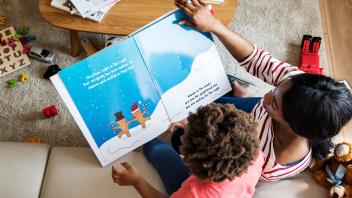When children hear books read aloud, they come to understand why learning to read is important. They learn that people read for different reasons – books that tell a story can be read for pleasure; books full of facts and information can be read in order to learn new things. Children learn a great deal when they listen to books read aloud – they hear new words, learn new ways of saying things, and are introduced to new ideas, different people, and faraway places.
When reading a book with your children, you can:
- Let them hold the book and turn the pages.
- Talk about different parts of the book such as the front, back, title page, first page, and last page.
- Take your time reading. Do not rush.
- Point to the words as you read. Help them to see that there are spaces between words, that you read from the top of the page to the bottom, and that you read from left to right.
- Ask them to think about the story as you read it.
- Point to the pictures and talk about them.
- Read expressively: talk the way the story’s characters would talk; make sound effects and funny faces; and vary the pitch of your voice throughout the story to make it more interesting.
- Encourage them to ask questions about the story’s characters and events.
- Talk about the story and relate it to their personal experiences.
To make reading an everyday part of life
- Get library cards for your children and let them choose books to check out.
- Let your children participate in community literacy programs. Enroll them in library-sponsored summer reading programs.
- Ask local bookstores if they sponsor a children’s story hour where good books, stories, and poems are read aloud.
- Start a neighborhood reading club where children get together regularly to read and share books.
- Swap books with family and friends so that your children will have more books to read.
- Encourage your older children to read with your younger children.
- Remember to keep reading aloud to your children even after they read on their own!
Citation
Adapted from: Beginning Reading Instruction: Practical Ideas for Parents. (1996). Texas Education Agency.
